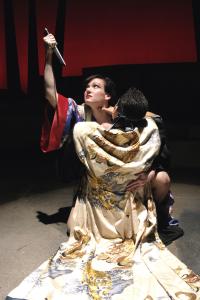 By Ken
By Ken
“You’re only as good as your last film.”
That’s an accepted dictum in the entertainment industry. Does that apply to being “diverse,” “non-traditional,” or “un-racist”?
Color-blind casting has long-been an attribute of The Blank Theater Company, with its celebrity performers and Noah Wyle serving as artistic producer. The LA Times even praised it for its color-blind casting and the theater’s new musical, See What I Wanna See, is based on the short works by Ryunosuke Akutagawa, a famous 19th century writer who is called the “Father of the Japanese short story.”
While the first segment involves lovers in medieval Japan, the production boasts no Japanese or remotely API actor in the roles.
When asked about the casting, artistic director Daniel Henning responded via email, “The roles have never been played by Asian actors except when the show was done in Seoul.” He also rationalized the casting decisions by saying that the Japanese segment is only about “7% of the show.” While the casting notice on Actors Access referenced the Japanese milieu (sans percentage) and source material, there was no specific request for Japanese or any other Asian ethnicity.
Henning promoted his non-traditional casting history in his response but wouldn’t it be more progressive to break the tradition of casting Caucasians in these roles? Is the percentage of the time on stage pertinent? What if I was casting a film based in Zaire, but justified casting all white people because they’re only in the background? Could the reason he could not find any (as he said) qualified Asian talent, is because the notice didn’t specifically seek them out?
The artistic director concludes his statement:
Our dedication to diversity should be obvious to even the casual observer, and we stand behind our credentials to prove that. But the one thing we will NEVER do is to compromise the artistic integrity of a production in order to cure society’s ills.
As a casual observer, I did notice Alec Mapa’s non-traditional casting in their recent show. But as that same observer, I know only what is happening now. History is not something that creates justification for future ills. It may be a character witness, but the ultimate judgment relies on the immediate.
ABOUT KEN: Ken Choy is an actor, writer, community organizer, and producer of Breaking the Bow. He is gay, green, and gluten-free. He’d like to credit Erin Khue Ninh for helping him edit this post.
[Photo credit: Lyric Stage, Broadwayworld.com]







